Then unattached Lionel Bringuier has just messaged that he’s conducting the national orchestra on tour tonight.
Where’s Emmanuel Krivine, the outgoing chief conductor? Good question.
Un grand bonjour de Salzburg! Je me réjouis beaucoup des concerts ce soir et demain avec l’Orchestre National de France et Julia Fischer.
Greetings from Salzburg! Very much looking forward to sharing the stage with Julia Fischer and the Orchestre national de France tonight and tomorrow.

The Scottish violinist Nicola Benedetti will perform ahead of the GRAMMY Awards on January 26, streamed live via GRAMMY.com.
Benedetti is nominated for Best Classical Instrumental Solo (Marsalis: Violin Concerto) and Wynton Marsalis is nominated for Best Contemporary Classical Composition.
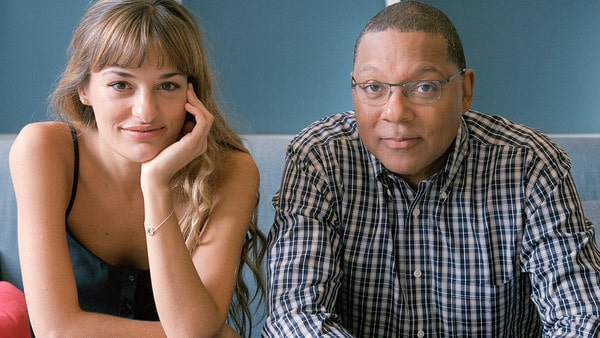
The Hungarian cellist István Várdai, 34, has been appointed artistic diretor of the Franz Liszt Chamber Orchestra.
He says: ‘This is an ensemble with a great past, and I have always enjoyed playing with them, because they play at the highest level. It will be a very inspiring and beautiful task to perform with a group of outstanding musicians on the world stage and develop an artistic concept that is internationally outstanding. I was delighted to accept the offer of concertmaster Péter Tfirst and the Orchestra, because I feel that the key to the Franz Liszt Chamber Orchestra’s and my own artistic development is the same: to create, as Hungarian musicians, music and art programs that give the audience a lasting experience and high cultural value anywhere in the world.’
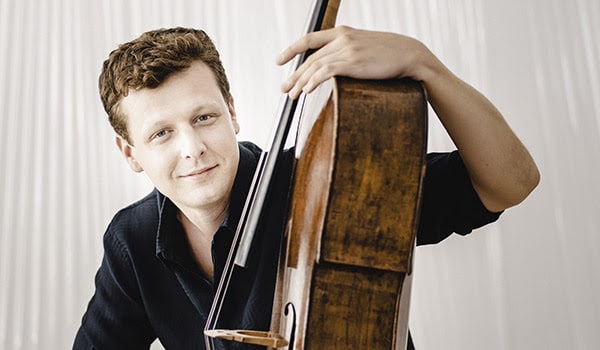
The former New York Phil chief has been appointed music director of Royal Swedish Opera in Stockholm.
He is also head of the NDR Elbphlharmonie orchestra in Hamburg.
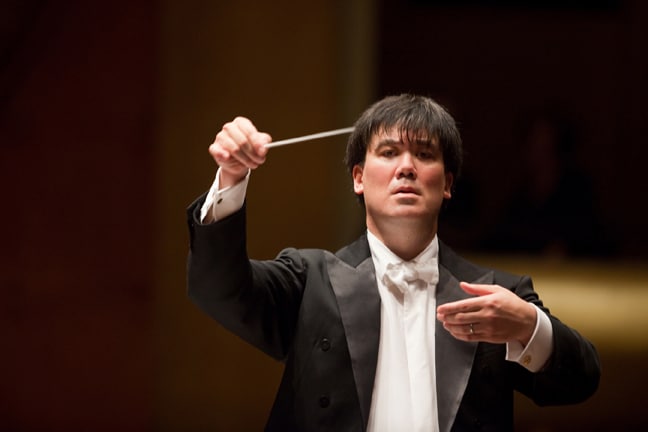
Gilbert put in 8 choppy years at the NY Phil. Before that, he was head of the Stockholm Philharmonic.
He’s known to the Swedes.
From the press kit:
“I am thrilled to welcome Alan Gilbert to the Royal Swedish Opera as our Music
Director,” says CEO and Artistic Director Birgitta Svendén. “Alan’s performances with
the company over the past several seasons were major highlights for our audiences
and for everyone involved in the productions, artistic experiences of exceptional
quality that I will never forget. We feel it is a major achievement for us, indeed a
critical milestone, to bring a musician of his extraordinary stature and international
reputation to our company. We are filled with pride to have such a visionary
conductor join us, someone who will inspire the whole organization musically and will
be at the core of everything we do. His leadership will no doubt enable us to take our
company to the next level in terms of our artistic breadth and excellence. With his
long personal history in the city and deep connection to our company, Alan will not
only be our Music Director, he will be a member of the ‘family’.”
The Boston Globe has the story of Murray Daniels, a former air force pilot who lost three middle fingers in a snowblower accident but plays on with prosthetics at his local church.
Read here.
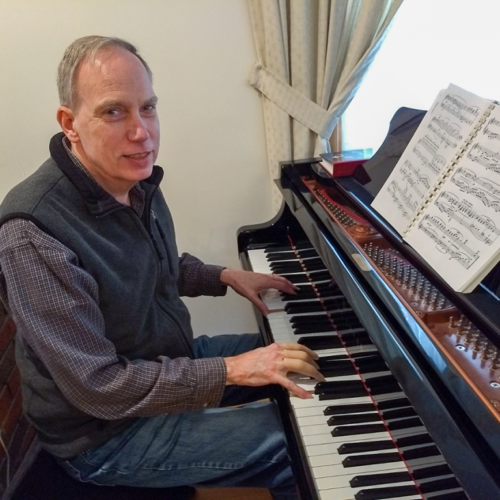
Angela Elster, Vice-President of the VSO School of Music, has been named CEO of the Vancouver Symphony Orchestra.
Music director Otto Tausk says: ‘Angela and I share a vision for an orchestra that is both focussed on artistic excellence and integrity as well as deep engagement with our community. I am very excited to have her as a new partner in leading this organization as we chart our path to becoming the orchestra of the future.’

The Czech-born ethnomusicologist Bruno Nettl died yesterday at 89.
A child refugee from Hitler, he taught at the University of Illinois and conducted research among Native Americans, and in Iran and South India.
His first book was published by Harvard in 1956. Its title, Music in Primitive Culture, would have got him deplatformed today.
Nettl pursued his discipline oblivious to fad and fashion.
He enjoyed a 65-year marriage to Wanda and enriched the minds of thousands of pupils.
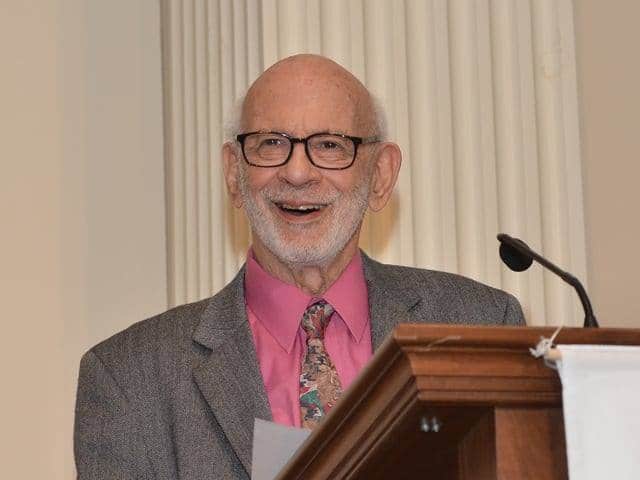
The British viola player Timothy Ridout will receive the first issue of a 10,000-Euro award established by the Hamburg Symphony Orchestra in memory of its last conductor, Jeffrey Tate.
Ridout, 24, made his Hamburg debut last month and will be presented with the award in two weeks’ time.

Under pressure from sections of the media and the political establishment, the Berlin State Opera has been forced to issue a press statement confirming that Placido Domingo will sing in its Traviata production tonight and next Tuesday.
Matthias Schulz, the chief executive, said his company takes sexual issues seriously: ‘Obviously we take any accusation of sexual harassment very seriously. The safety of my colleagues and artists has the highest priority at all times. In this specific case, we are sticking to the appearances of Plácido Domingo, who always behaved in an exemplary manner with us at this house, and we do not see enough evidence to break a long-standing contract.’
A local group, “Pro Quote Bühne”, had demanded a Domingo ban and promised to picket his performances.
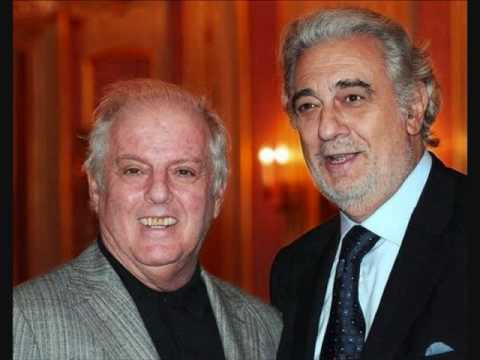
Hamburg State Opera has also confirmed that Domingo, 79, will sing in Simon Boccanegra in March and April.
Read on: Domingo’s choices.
Welcome to the 13th work in the Slipped Disc/Idagio Beethoven Edition
String quartets opus 18/1-6
A new century had just begun when Beethoven made his first utterances in the format that Haydn invented. It is almost as if he waited until the 19th century had dawned and he was 30 years old, knowing he could do something so different that it would never be mistaken for the work of any other composer, or of the classical past. The six quartets that make up his first set were written for his friend, the violinist Karl Amenda, whose employer Prince Lobkowitz could afford to pay for them.
The bold opening statement of the first quartet, played by all four instruments together together and without harmony, is a clear breach with the ingratiating intros of Haydn and Mozart. Beethoven is saying ‘listen up’, and we do. Each instrument then has its own riff on the composer’s statement. It sounds almost like free speech, which cannot have been lost on the Prince and his household in the fragile social atmosphere of 1800.
The slow movement of the first quartet makes reference to the vault scene in Shakespeare’s Romeo and Juliet. Once again, Beethoven is staking his ground as a composer who covers the whole of civilisation. The music is rapturous, and it never looks back. Across six quartets, it just grows and grows (although the finale contains a self-quote from Beethoven’s string trio, opus 9).
In my listening, I have tended to rule out ensembles like the Amadeus Quartet who like to root Beethoven in the classical past and veer more towards those who see him as sui generis. Adolf Busch and members of his family, recorded at Abbey Road in 1933, are overwhelmingly convincing in the first quartet.
The Vienna concertmaster Walter Barylli and his 1953 quartet are exhilarating in the last.
Betwixt and between, there is an abundance of choice. The Budapest String Quartet (1952) and the Fine Arts (1966) display a breezy can-do attitude towards the set which is engrossing as you listen, less enduring when it’s over.
The Guarneri and the Emerson extend this attitude into something of an American Beethoven tradition, and no worse for that.
Many swear by Peter Oundjian and the Tokyo Quartet in the gripping Malinconia of the closing quartet, a clear anticipation of the next period in Beethoven’s life, the Eroica years.
The Alban Berg Quartet are so accomplished they make you forget how difficult these quartets are to play, let alone play well. For a more human, introspective touch, go to the Belcea Quartet.
My pal Tim Page writes: I’m very fond of the Yale Quartet set of the late Quartets. It came out on Vanguard some 50 years ago and has something of a cult about it. It makes palpable sense of the music while never becoming prosaic. I’m also very fond of the Hollywood String Quartet version. For a complete set I might go with the Alban Berg, the EMI recording. The early Budapest give an understanding of why they were so revered in their time. The Capet is wonderful in 132 as I recall.
The Israeli psychoanalyst and Haaretz music critic Amir Mandel casts his vote for the Vegh Quartet (with surely the most evocative cover ever to decorate a string set).
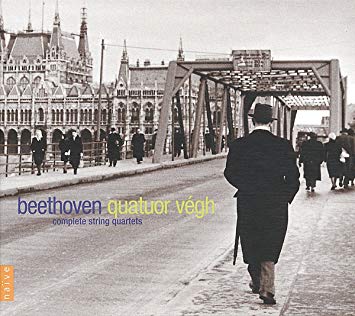
The violinist Gidon Kremer opts unexpectedly for the Quartetto Italiano – and you will quickly understand why They play like Pavarotti sings, without any sign of effort.
Such variety out there. Get listening.










